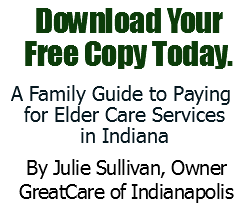This is Part 1 of a 6-Part Series for families regarding ways to pay for elder care services in Indiana. This information accompanies the 23- page e-book/guide called “A Family Guide to Paying for Elder Care Services in Indiana“, available for free download HERE.
page e-book/guide called “A Family Guide to Paying for Elder Care Services in Indiana“, available for free download HERE.
Medicare and Traditional Health Insurance
There is a common misconception that health insurance will pay for the cost of long-term care. Health insurance including Medicare, Medicare Supplements, HMOs, private insurance through employers, and disability insurance were never designed to pay for the cost of long-term care.
Medicare and Other Health Insurances
Medicare is a federal health insurance program for people 65 and older, certain people with disabilities, and ESRD (End Stage Renal Disease). It pays for much of your health care, but not all of it. There are some costs you will have to pay yourself. (www.medicare.gov)
There are other kinds of health insurance that may help pay the costs that Medicare does not. Medicare Supplements (Medigap Policies) and Long-Term Care Insurance will pick up some of the costs that Medicare will not pay for.
Medicare was implemented in 1965.
How many times has Medicare been over-hauled since 1965?
NEVER. It was not designed to pay for care related to diseases or conditions such as Alzheimer’s disease, Parkinson’s, or MS. The average life expectancy was much lower in 1965 because medical technology was not as advanced. Medicare was designed for SHORT-TERM acute care, and short-term rehabilitative stays in a rehab or long-term care facility. Although Medicare Part D was added in 2004/2005 to help with the costs of prescription drugs, Medicare still does not pay for long-term care.
What will Medicare pay?
Medicare comes in three parts.
Medicare Part A, Part B and now Part D for prescription drugs.
Medicare Part A is Hospital Insurance.
Part A pays for inpatient hospital care, some skilled nursing facility care, hospice care, and some home health care. Most people get Medicare Part A automatically when they turn 65. There is usually no premium or monthly payment for Part A.
Medicare Part B is Medical Insurance.
Part B pays for doctor’s services, outpatient hospital care, and some other medical services that Part A doesn’t pay for. Part B pays for these services and supplies when they are medically necessary. Part B has a premium that changes every year.
What will Medicare A and B NOT pay for?
Medicare carries some high deductibles.
- For instance during a hospital stay you will automatically have a deductible for days 1-60. On day 61 you are responsible for a certain amount per day through day 90.
- On day 91 you pay even more per day (your deductible) through day 150. This amounts to a substantial out-of-pocket expense for the Medicare recipient.
- For a skilled nursing facility stay, Medicare pays for days 1-20. On day 21 you pay a certain amount per day deductible through day 100.
- Also, you will be responsible for 20% for most covered services under Part B, 50% for outpatient mental health treatment, and a co-pay for outpatient hospital services.
Tip: Medicare was never designed to pay for long-term care. In other words, if you will be living in a nursing home or if you will need around the clock care at home, Medicare does not pay for these services. Medicare is for acute, short term medical care and rehabilitative care only, otherwise called “skilled care”.
Defining Skilled Care vs. Custodial Care
Skilled care is defined as care that is prescribed by a physician and performed by a licensed health care professional, like a nurse, physical therapist, or occupational therapist. Some examples of skilled care include: some wound care, IV antibiotics, or physical therapy immediately after a stroke.
Custodial care is another term for private pay care. This type of care can be performed by home health aides or other unlicensed caregivers, like family members. Some examples of custodial care include bathing, dressing, transferring from the bed to a chair, or toileting.
Medicare Supplements
Medicare Supplements, often referred to as Medigap plans, are purchased through private insurance companies to help fill the “gaps” that Medicare leaves behind. Medicare Supplements pick up the co-pays and deductibles associated with standard Medicare. There are ten standardized plans available labeled “A” through “J”. Each plan has a different set of benefits. Medicare Supplements also do not cover the cost of long-term care; they simply pay deductibles and co-pays that Medicare does not.
Medicare HMOs (a.k.a. Medicare Advantage or Medicare+Choice)
HMOs are Health Maintenance Organizations. An HMO will require that the participant use certain doctors and hospital systems in their area. HMOs are also for short acute care stays in hospitals, and for short rehabilitative stays in skilled nursing facilities. They do not pay for the cost of long-term care.
Private Insurance
Private health insurance through an employer or previous employer is essentially the same as HMOs, as far as coverage. Standard health insurance, no matter how great the benefit, will ultimately not cover long-term care.
Disability Insurance
Disability insurance covers household expenses, and is designed as income replacement. It will pay for things like groceries, rent and utilities. This insurance was not designed to cover the added expense of long-term care.
Veteran’s Administration Benefits
Many Veterans mistakenly believe that when they need long-term care, their VA benefits will pay the expense. VA benefits for long-term care are available, but the majority of those benefits are reserved for people with service connected disabilities. Check with your local VA office for more information.
Next Up Part 2: Understanding Medicaid in Indiana
Follow Us!